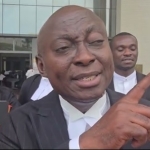
What is happening at Wesley Girls today is not new to me. I experienced a quieter version of it at Bishop Herman. I chose Bishop Herman only for its academic excellence. I did not go there to embrace Catholic ritual. I am Pentecostal. If there had been a Pentecostal school with the same academic strength, I would have gone there. Yet inside Bishop Herman, the daily rhythm of school life revolved around Catholic practice.
Mass, rosary, feast day rituals, and subtle expectations that leadership positions would naturally fall to Catholics. Muslim students were given a small prayer space, which created the appearance of tolerance, but beneath that appearance, there were tensions in the way power operated. I still remember Reverend Father Dr Paul Agbodza banning Scripture Union because he believed it would create too many interpretations of Scripture.
At 15, I accepted that explanation. Today, with legal maturity, I understand how deeply unconstitutional it was. I also remember my friend Sam Djaba. He was widely admired and respected by students, yet he was denied the position of assistant head prefect. Many of us believed it was simply because he was not Catholic. Student leadership selection was not democratic. It was controlled by the mission head. At the time, we accepted it as normal. But what business does a publicly funded institution have enforcing sectarian preference?
This is why the Wesley Girls saga is not simply a culture clash. It is a constitutional moment that should have come long ago. Mission schools in Ghana ceased being private moral monasteries when the Government of Ghana adopted the Accelerated Development Plan of 1951 and rolled it out from 1952. That policy brought mission schools into the public system.
The state assumed responsibility for buildings, salaries, curriculum, administrative oversight, and expansion. At Bishop Herman, everything came from the state and the Parent Teacher Association. The Catholic Church did not fund our daily operations. Even the cow we enjoyed once a month came not from a mission budget but from the personal generosity of Bishop Francis Anane Lodonu, who loved his alma mater. Once the state takes over a school, the school becomes a public institution subject to public law. Under Article 1 of the 1992 Constitution, the Constitution is supreme, and any rule inconsistent with it is void.
This forces a simple legal question. When a publicly funded school enforces a rule connected to religion, what constitutional standard applies? The answer is strict scrutiny. It is the highest standard of review for policies interfering with fundamental rights such as freedom of religion. When strict scrutiny applies, the school must show a compelling governmental interest and prove that the rule is narrowly tailored to achieve that interest without unnecessarily burdening rights. Can a mission school banning a student from fasting satisfy such a test? No. Can compelling students to participate in religious rituals or denying leadership roles based on faith satisfy such a test? No. There is no compelling governmental interest in enforcing sectarian ritual in a school paid for by taxpayers of every religion. Even if the school argues discipline or tradition, are those compelling interests under constitutional law? They are not.
Strict scrutiny also demands narrow tailoring. A school cannot impose a rule with sweeping impact on students of other faiths when a less restrictive alternative exists. If a school wishes to preserve its tradition, it may do so internally but without imposing that tradition on students who do not adhere to it. You cannot force a student in an Islamic government takeover school to dress according to a specific Islamic code. Likewise, you cannot compel students in a Catholic government takeover school to follow Catholic religious discipline. Internal policies may exist, but they must never have a disproportionate effect on any student on the basis of religion. This is not sentiment. This is constitutional law. Nostalgia about mission history cannot override the legal rights of present-day Ghanaian children. Nostalgia is not law. Sentiment is not law. Tradition is not law. The Constitution is the law.
Those defending the Wesley Girls’ policy argue that mission schools have always had their traditions and that these traditions should be protected. But once the government occupies the educational field, preemption occurs. Government control, government funding, and government administration convert the school from a mission enclave into a public institution. The money funding these schools comes from Muslims, Christians, traditionalists, and non-believers alike. How do you justify taking money from all Ghanaians and then imposing the religious identity of only some Ghanaians? If the missions want full doctrinal control, should they not withdraw from the public system and assume full funding responsibility? They cannot claim the benefits of public finance and deny the obligations of public neutrality.
The issue becomes clearer when we look at the United States. In Texas, a law known as Senate Bill 10 attempts to force public schools to display the Ten Commandments in classrooms. In Oklahoma, state leaders have attempted to inject Bible centered curriculum into public schools. In both cases, lawsuits have been filed because public schools are state institutions and cannot endorse or impose specific religious doctrine. Federal courts have already blocked aspects of the Texas law, reasoning that compelling religious displays in classrooms coerces students who cannot simply walk away. Although each American state enjoys autonomy and although the Supreme Court has not yet taken up all these cases, the principle remains consistent across decades of jurisprudence. Public money demands public neutrality. A public school cannot advance one religion.
Ghana’s constitutional framework is even clearer than the American one because Ghana is a unitary state. We do not have 50 state constitutions to navigate. We have one Constitution with supremacy clauses and explicit protections of religious freedom. If American courts can challenge religious coercion in publicly funded schools despite historical Christian influence, does Ghana not have an even stronger basis to demand strict neutrality? Ghanaian students of every faith are entitled to equal respect, equal opportunity, and equal dignity. No student should be compelled into practices they do not believe in simply because missionaries founded the school many decades ago.
This lawsuit at Wesley Girls’ is long overdue. For decades, Ghana has allowed internal mission school policies to overshadow constitutional guarantees. Many of us from Bishop Herman and similar schools lived through discrimination but accepted it as the natural order. If I knew then what I know now, would I have challenged those rules? Yes. A student leadership role denied to Sam Djaba because he was not Catholic was not tradition. It was discrimination. A ban on Scripture Union was not discipline. It was an unconstitutional suppression of religious expression. Policies that deny fasting or impose ritual are not moral guidance. They are violations of rights.
Ghana must now choose a clear path. If mission schools enjoy public funding, they must uphold the public law of neutrality. They may preserve their heritage symbolically, but they cannot enforce it coercively. The Constitution protects every Ghanaian child equally, and no tradition can override it. Ghana should have reached this point long ago, but it is better late than never.
The government had already occupied the field. What we have been doing is just pure romanticism, and I will call it negritudism lol. It is the taxpayers’ money that does everything. There must be neutrality.
We have condoned these religious overtures as precedent for far too long. If one wants to experience a Methodist discipline that the government cannot provide, let them send their wards to purely private Methodist institutions.
Government institutions must not be turned into religious monasteries. If they insist, they should reclaim their schools from the government, and so the government can wash its hands entirely. The government is legally allowed to pull that trigger.
- President Commissions 36.5 Million Dollars Hospital In The Tain District
- You Will Not Go Free For Killing An Hard Working MP – Akufo-Addo To MP’s Killer
- I Will Lead You To Victory – Ato Forson Assures NDC Supporters
Visit Our Social Media for More




